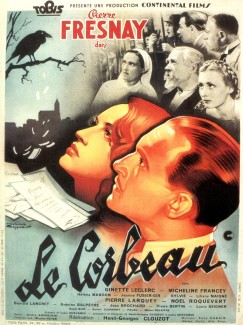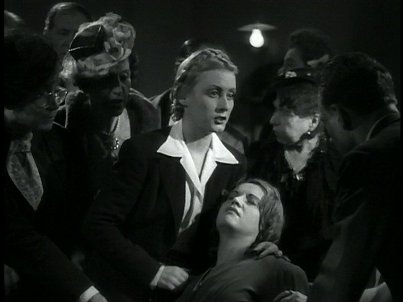A part of this viewing list: Criterion Collection Spine #227: Henri-Georges Clouzot’s Le Corbeau.

Le Corbeau was made in occupied France in 1943. It was denounced by the Vichy government, denounced by the French Resistance and denounced by the Vatican. For a film that seems rather innocuous in 2006 America there must be a lot of subtext that would have been picked up by World War II era French folks. The story takes place in a provincial town during the occupation and the action revolves around mysterious, anonymous “poison pen” letters that are circulated among the townsfolk, containing just enough truth and just enough lie to turn the town into a mob of pitchfork-and-torch-waving lunatics. Minus the pitchforks and torches.
Casting Pierre Fresnay, star of La Grande Illusion creates a distinct and immediate juxtaposition between both films. In one, Fresnay is a French officer and German captive and there is honor and respect from both sides. In Le Corbeau, there is not a German to be seen and Fresnay’s Dr. Germain is a suspected abortionist. Yet the absence of any mention of the war or Germany in the light of Fresnay’s 1938 performance in La Grande Illusion invites a comparison of the Germans then to now along with the juxtaposition. Clouzot could not have been openly critical of the occupied government, so casting Fresnay was inspired in this regard.
The Resistance probably didn’t like the film because there is no resistance in it. Everyone is just continuing with their lives as if the war was not even happening. They should have been happy with the obvious statement that informing on people is one of the surest ways to destroy a community. But perhaps this was the very reason they objected, since this film shows just how effective it can be. This is just conjecture.
The Vatican obviously hated this because of all of the abortion talk and all of the pre- and extra-marital sex that is going on while husbands are “gone”.
In terms of a mystery and suspense film the execution is extraordinary. Most of the main characters have the means, motive and opportunity to pen the letters, and it is only as the film progresses that some are eliminated. Added into the mix we have copy-cat corbeau’s, inquests, a nun named Marie-Corbin who everyone initially suspects, and a morphine thief. There is murder and mayhem, and some of the ugliest and mannish French women I’ve ever seen. Until the last two minutes we’re still not sure who Le Corbeau is.
As subtle as this film is, it is still quite brave of Clouzot to make something such as this during the occupation. Lacombe, Lucien wasn’t made by Louis Malle until 1974, so fraught was the subject of French informing during the war.
